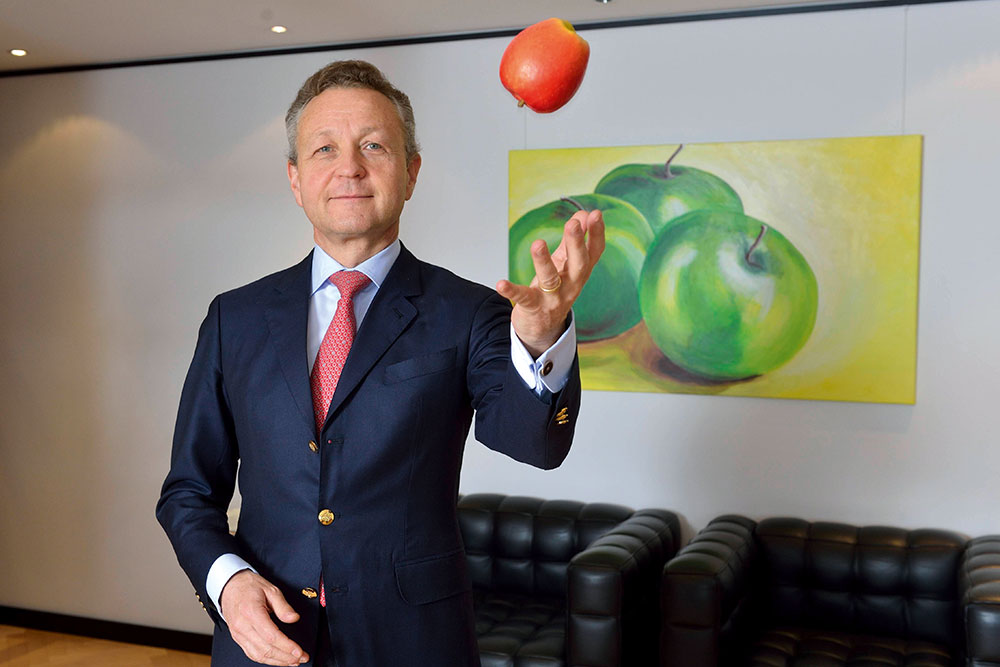Prof. Klaus Josef Lutz, chief executive officer at BayWa AG
Fraunhofer magazine 3.2022

The pandemic, the war in Ukraine and this summer’s heatwaves are all inspiring a rethink in the food production industry. Smart farming, agrivoltaics and alternative proteins could see major breakthroughs.
Harnessing crises as a catalyst for growth: Without the pandemic, digital transformation would never have achieved the major breakthrough it has. Remote work and virtual doctor appointments would still be a long way off. Now the war in Ukraine and the climate crisis, which this summer’s scorching heatwaves finally brought to the fore again, are putting our way of life to the test. With no real experience of food scarcity, we in Germany have long dismissed food shortages experienced in other regions. Now, basic foodstuffs are even becoming more expensive in Germany, with some supermarket shelves remaining empty for periods. Demand for products such as fertilizer is high, and supply chains are fragile. Everything is interlinked: If energy supplies drop, containers such as glass bottles cannot be produced. It’s time to rethink agriculture, food production and food distribution. But the good news is the required technology is already available. We just need to start using it on a larger scale. And avoid getting bogged down in pointless angst. Standoff debates like “eco versus conventional” do not help. Instead, both from an ecological and geopolitical perspective, we can agree that the best solution is to grow local products with as much resource efficiency as possible, and to consume them directly within the same local region. This applies right across the board – whether in Upper Bavaria, Australia or Africa. I believe that the following three trends will revolutionize our food supply:
Smart farming
Subarea management makes it easier for farmers to accurately determine and control what they sow, irrigate and fertilize, when and where, and in what quantities. Advanced GPS-controlled technology also helps in controlling weeds and pests, while self-propelled hoeing robots are being rolled out to compensate for labor shortages. What’s more, pesticide usage can be significantly reduced. Satellite images document the progress of individual harvests – and can even be used to provide reliable economic analyses, such as the yield forecasts for Ukraine provided by BayWa subsidiary VISTA this summer. For countries with difficult climate conditions, smart farming opens up the possibility of reducing dependence on imports. Regardless of climate, it is worth questioning whether today’s cultivation methods and growing areas, crop rotation and storage techniques are viable for the future. One result of geoscientific analyses could be that we see more soybeans or sorghum growing in German fields in the future.
Agrivoltaics
Agrivoltaics allows us to kill two birds with one stone. Using arable land for electricity production reduces land consumption while simultaneously increasing productivity in crop cultivation. Here is one example from Gelsdorf in Rhineland-Palatinate, where BayWa r.e. and the Fraunhofer Institute for Solar Energy Systems ISE have initiated a research project. Photovoltaic modules installed high above the treetops provide targeted shade for apples, protecting them from heavy rain, hail and frost. The electricity they generate can be used directly for electric, self-propelled agri helpers or for irrigation technology.
Alternative proteins
Alternative plant-based or cell-based proteins are becoming increasingly attractive as a supplement to traditional meat, fish and dairy products. They can often be produced locally and all year round. A good example is the Berlin-based start-up VEgg, which produces a vegan egg, complete with shell. A young man from Austria, who I met at the Future Food conference we organized in early 2022, has taken it a step further. His company, Kern Tec, produces baking ingredients and oils from apricot and cherry pits that would otherwise end up as garbage. We are literally talking about leftover food here, but in more investor- friendly terms, this is referred to as upcycling and zero waste. What are the risks facing the revolution in food production and supply today? Two factors could weaken its momentum. Firstly, our complacency and lack of foresight. And secondly, I have deep concerns about the regulatory obsessions of German and European authorities. An entrepreneur can win over any number of supporters to their project – but all it takes is just one official to stand in their way, and bring innovation to a grinding halt. It’s good to have an intermediary like the Fraunhofer-Gesellschaft in your corner, as is the case for VEgg co-founder Verónica García-Arteaga.